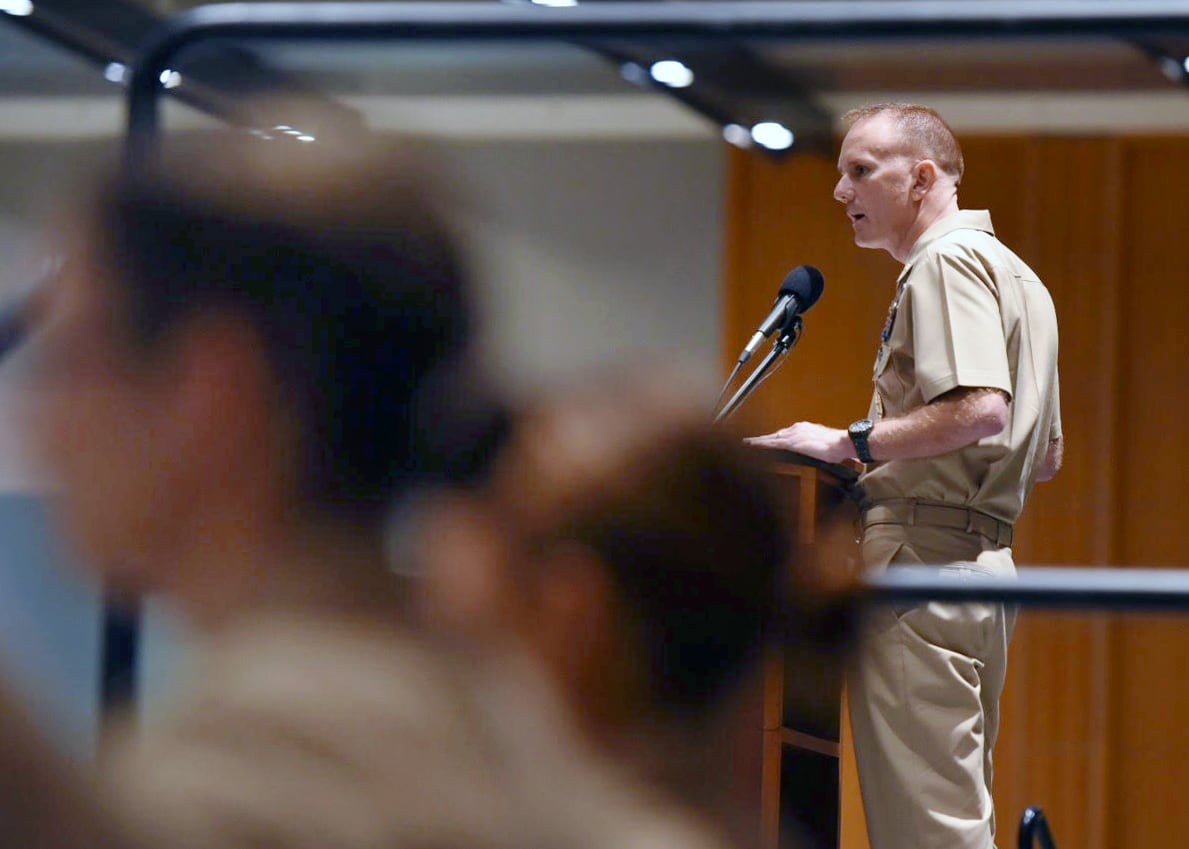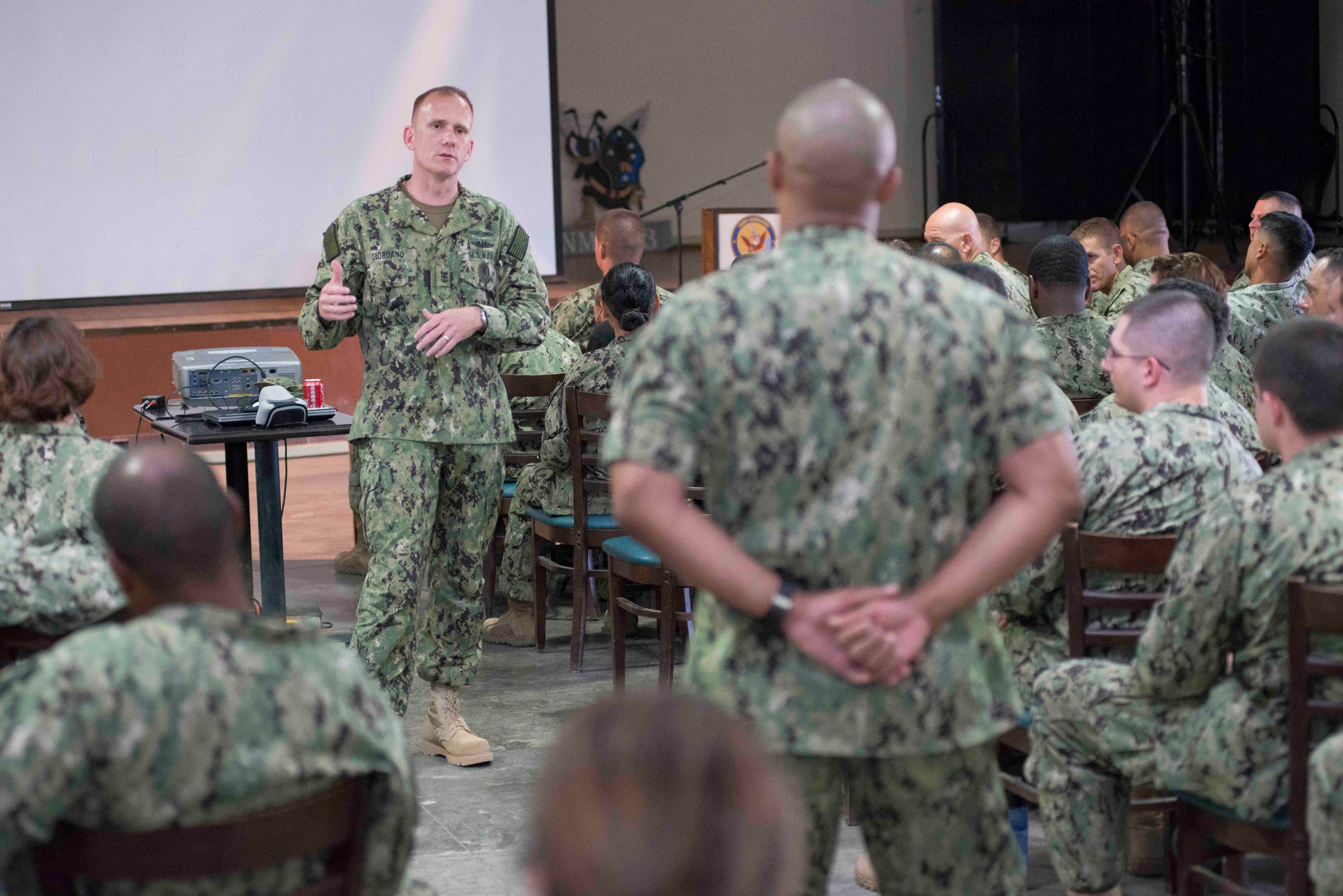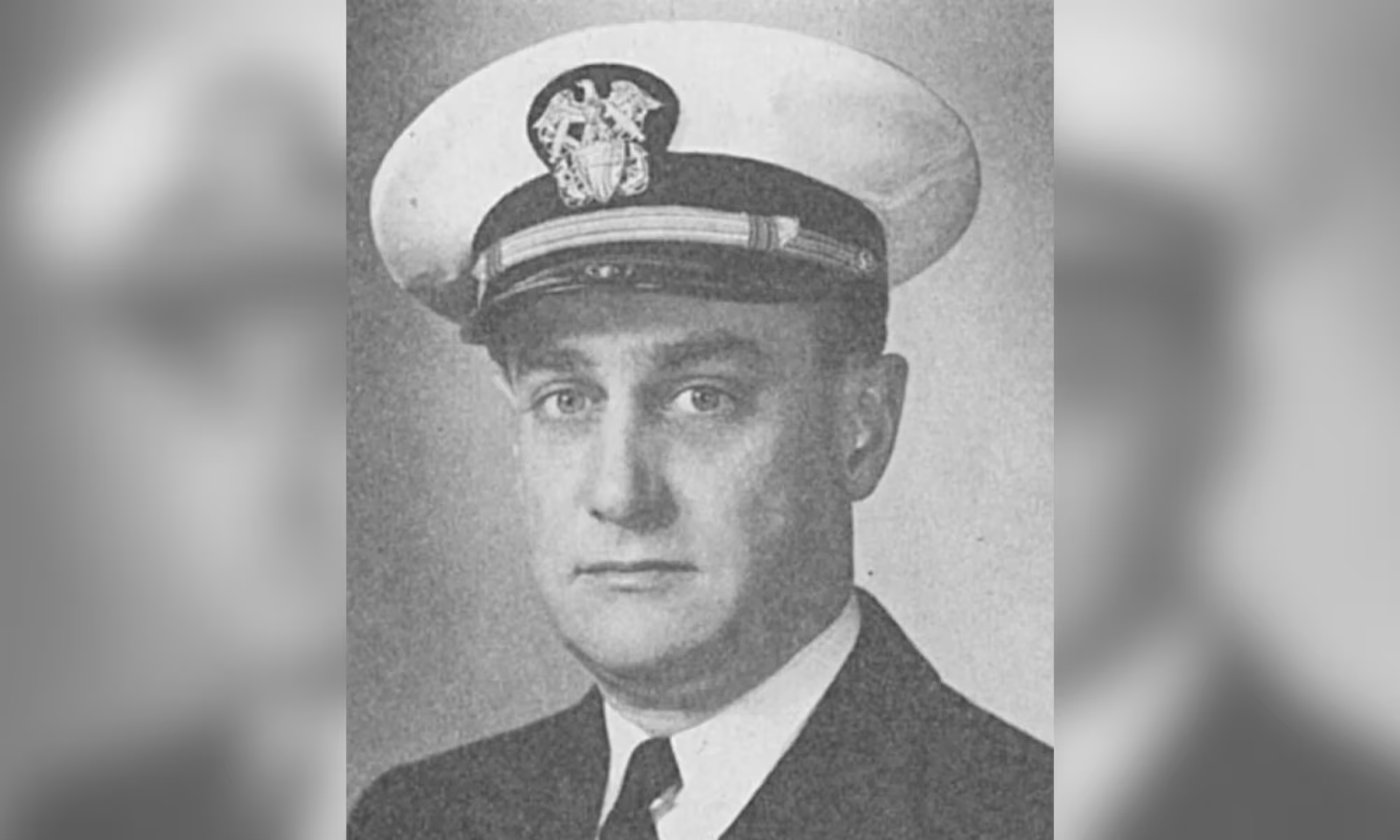Steven Giordano was a superstar first class petty officer when a lapse in judgment nearly scuttled his military career.
It was 1996 when the seven-year cryptologic tech and qualified submariner was taken to mast, the Navy's nonjudicial punishment process where a commanding officer rules on disciplinary matters.
"I had an inappropriate relationship with a junior sailor who was married, and I was wrong," Giordano, the Navy's new top enlisted sailor, recalled in an interview with Navy Times. "I took ownership of my actions then and accepted the discipline I was given at captain's mast — losing a stripe and having to spend the next four years again as a second class."
Giordano called this mistake a watershed moment, one that served as a catalyst for him to change his life and reshape his career, which culminated in his rise two decades later to be the master chief petty officer of the Navy. Giordano took charge on Sept. 2 as the Navy's 14th MCPON, a role that advises the chief of naval operations on enlisted matters, advocates on behalf of sailors with lawmakers and Pentagon leaders and serves as a role model for the Navy's 268,000 rank-and-file personnel.
Giordano is a highly respected cryptologic operator, a career field that largely operates in the shadows, intercepting the communications of potential adversaries. His professional record is otherwise spotless, Navy officials said. Still, his past misconduct makes him an unusual choice to become MCPON and is likely to raise questions in some quarters. By many accounts, similar missteps today would almost certainly prohibit a sailor from re-enlisting let alone advancing in the ranks.

Giordano was not initially set on a Navy career but rapidly established himself as a talented cryptologic technician who sought hard to get qualifications like the submarine warfare pin.
Photo Credit: MC1 Martin L. Carey/Navy
Giordano's affair with his subordinate strained her marriage, according to the now divorced couple. They weathered the fallout for years but separated a few months ago. The ex-husband approached Navy Times in June after news that Giordano was selected to be MCPON; he disclosed the affair and questioned why the Navy hadn't settled instead on a top-tier candidate with an unblemished record. His ex-wife also acknowledged the affair with Giordano. Both agreed to share their stories on the condition of anonymity, saying the episode remains traumatic and while he worried about fraying his ongoing business ties to the Navy, she feared having to publicly relive the darkest days of her failed marriage.
Giordano has been married to his wife, Elka, for 17 years and says the past lapse in judgment has not happened again.
What do you think Giordano's selection as MCPON means for the Navy? Share your perspective with Staff Writer Mark D. Faram.
Navy leaders say they were unaware of Giordano's nonjudicial punishment — known as an NJP — before he was selected from a host of top master chiefs, officials confirmed. It's likely the selection committee that recommended him to Chief of Naval Operations Adm. John Richardson reviewed only the last five years of Giordano's Navy record, one official said. The board has the prerogative to review a candidate's entire service record, but typically limits its review to the last five years.
"Most of the time senior enlisted selection and continuation boards as well as nomination packages only go back five years in evaluations they consider," said the senior enlisted sailor, who asked for anonymity to discuss these processes publicly. "Only if there is some red flag do they dig deeper, so it's fully likely that because so much time had passed, this wasn't considered."
When Giordano was selected for chief petty officer in 2003, the NJP was already seven years in his past and with each successive selection, it became less likely it would surface.
Giordano granted Navy Times two interviews after his selection for the Navy's top enlisted job. During each, Navy Times sought to understand the darkest chapter of his military service and how it ultimately reshaped his career. Giordano said the selection board did not ask about his extramarital affair and he made no attempt to hide it during the screening process for his new job as Richardson's adviser.
"When you go through multiple selection processes for chief petty officer, senior chief, the command master chief and senior chief programs as well as for force and fleet jobs, your record is an open book," Giordano said. "Those selecting you have the ability to look at everything in that record and ask questions of anything — this has never been an issue."
In June, Richardson told Navy Times that selecting Giordano as MCPON from a field of highly qualified candidates "was a very hard decision, perhaps the hardest I have made since becoming CNO" in September 2015. When Navy Times alerted the admiral about Giordano's past misconduct, a spokesman said Giordano was the right choice.
"MCPON Giordano has served exceptionally for the 20 years following this incident, being promoted again to first class petty officer then selected for chief, senior and master chief petty officer, command master chief, fleet master chief, force master chief and finally, MCPON," CNO spokesman Cmdr. Chris Servello said in a statement. "Navy leadership views MCPON Giordano as a sailor of integrity and toughness — one who is capable of accepting accountability and learning from mistakes. He will play a central role in leading our team through the challenges and opportunities of today and tomorrow."
A RAPID ASCENT
Giordano was the sixth of seven children raised by a single mother. He grew up in the suburbs of Baltimore and didn't know much about the Navy when recruiters came to his high school in 1989.
"I listened to what they had to say, but what really gravitated me to the Navy was my best friend, Kevin Knee, was really thinking of joining because he didn't think there was much out there that offered a future in Baltimore at the time."
The two friends signed up in the delayed entry program, where civilians agree to enlist before boot camp. Both had contracts guaranteeing them jobs in the high-tech world of cryptology, and that they'd be stationed together to start.
"Gio," as he's known by his buddies, turned 18 right before graduation and not long after attended boot camp in Orlando, Florida, with his friend.
"I remember lying in our bunks at night talking and wondering out loud what we'd gotten ourselves into," Giordano recalled. "All the time while trying to be as quiet as possible — so as not to get in trouble."
The friends' Navy paths began to diverge once they got into "C" school, which is more advanced job training and then headed to opposite corners of the cryptology community — and the world.
"At 'C' school I went the electronic intelligence route and he went in another direction to become what we call a 'Wizard Operator,' and once orders came out, he went to Adak, Alaska, and I went to Agana, Guam," Giordano said.
In Guam, at Fleet Air Reconnaissance Squadron 1, Giordano quickly built relationships and began learning the skills to be successful in the secret work of cryptology.
"I was a mission analyst, I wasn't a deployer, and my job was to debrief crews returning from missions," he said. "At one point after [Operation] Desert Shield began [in 1990], they needed someone with that skill set to deploy to Bahrain, and I raised my hand."
He recalled the Bahrain trip and the Navy's trust in him as an "amazing thing" and was promoted to second class petty officer in 1992. He next headed to Naval Security Group Activity Pearl Harbor in Hawaii, where he got his first taste for going to sea. It was there he made first class petty officer and earned the coveted dolphin pin, a big achievement for a cryptologic technician. But this is where his rapid rise through the ranks ground to a halt.
THE AFFAIR
Giordano was at the top of his game as a technician. Off-duty was another matter.
Single at the time, he began an affair with a married sailor at the command, whose husband was stationed elsewhere. Once news of the affair reached the command, Giordano and the woman — she was a lower-ranking sailor at the command — were taken to mast.
"It's a tough thing when you have to stand up in front of people and they look at you and award you — and it's an award — award you discipline," Giordano recalled.

Giordano sat with outgoing MCPON Mike Stevens for an Aug. 17 video interview. In late August, Giordano discussed his career and its most difficult period in a Navy Times interview at the Pentagon.
His commanding officer found Giordano guilty of violating Article 134 of the Uniform Code of Military Justice, a catchall used to discipline personnel whose conduct harms good order or brings discredit on the armed forces. Giordano was busted down one pay grade, a wake-up call that he said took years to process.
"I was reduced in rate from a first class to a second class petty officer, my time-in-rate counter restarted," he said. "Sometimes to be successful, you have to learn from hard lessons — and they held me accountable, and I held myself accountable for a standard that I broke."
It would be four years before he re-earned first class. The Navy was in the middle of its largest post-World War II personnel reduction and advancement opportunities were tight.
The couple whose 20-year marriage ended earlier this year also recalled that period as a dark time. The woman received nonjudicial punishment as a result of the affair and left the Navy within a year, the couple said. Her ex-husband, also a member of the cryptology community, stayed in the Navy until his retirement.
"That's the toughest part in all this, that you impact the lives of others," Giordano said. "You have to be a person who is willing to say that you'd made some poor choices, that you are sorry for them and be willing to do the hard work to change yourself."
Asked whether he had been involved with other extramarital affairs or if he's been the subject of other disciplinary action, Giordano simply said: "No."
The same incident today would likely be a career-ender. Giordano realizes that and said his second chance "forced me to become better."
DECIDING TO STAY IN THE NAVY
Within months of his NJP, Giordano was transferred to Fort Meade, Maryland, center of the U.S. government's cryptology world. On the toughest days, he considered quitting and getting a fresh start as a civilian. But those questions did not last, he said.
"I think every sailor has that moment, and mine came at Fort Meade, Maryland — near the 10-year mark, and I never really considered another path, I loved being a sailor," he said. "The beauty of the Navy is that if you have fortitude — there can be success after making a bad decision."
Of course, he had to wear his mistake on his sleeve. Sailors must have 12 years without disciplinary marks to trade the red petty officer chevrons and the service stripes on their dress blue uniform sleeves for gold ones. That stigma would become more conspicuous as Giordano rose through the ranks.
"For the next 12 years, I continued to wear red stripes and I wore them — and the hash marks, signifying service — for a long time. Another 12 years as I advanced to first class, chief and even senior chief petty officer."
"And you can imagine the conversations that come with that."
He discovered another dynamic of serving in a small community — that gossip and rumors follow you.
"How do you work through that, wondering what people are saying?" Giordano recalled. "You can do one of two things. You can gravitate towards all that negativity and it will drive you down — and had I done that, I wouldn't be sitting here today."
"You can recover from bad decisions you make," he added. "I'm living proof it can happen — but you can't get wrapped up in it — you just need to take it on board and use it to make you a better person."
Giordano met his wife in the late 1990s and that helped him change and move on. He and Elka married in 1999 and in 2000, he sewed back on his first class crow. His career blossomed. He transferred to Naval Security Group Activity Rota, Spain, and deployed to ships around the region.
"Amazing things happen when you find the right person to share your life with," he said. "Within our first week together, dating, I came clean with my past, my NJP and what had happened. I don't know why I told her all those things, she took it all on board and moved forward with me."

Giordano found his stride as a command master chief, first aboard frigate McClusky and then with Navy Information Operations Center Colorado. In 2015, as the top enlisted at Naval Forces Europe-Africa, he met with sailor at Camp Lemonnier in Djibouti.
Photo Credit: MC2 Daniel P. Schumacher/Navy
REACHING THE TOP
He took the tough jobs, sea duty overseas and then instructor duty at Pensacola in Florida. It paid off. He made chief in 2003. For Giordano, it was an especially sweet accomplishment.
"When I put the uniform on every day, I see the anchor," he said. "To achieve what not every sailor achieves — considering everything I'd been through — to say I was honored by that selection was putting it extremely lightly."
He was picked for senior chief three years later, still with the red stripes on his sleeve. It was only as a staffer at the Senior Enlisted Academy in 2008 when he finally donned gold stripes. There, his career took an unexpected turn.
The master chiefs who ran the school urged him to apply for the new command senior chief program. Giordano was picked in its early years. His boss at the school said that he felt it was time Giordano had a career development board.
"Once I was selected, the detailer asked where I wanted to go and I told him I wanted the biggest, greyest thing I can serve on," Giordano recalled. "He told me that he had frigates on the East Coast and frigates on the West Coast — I picked San Diego and the 'Mighty Mac.'"
By then, most of his career had been spent underwater on submarines and behind the cipher locks in secure spaces. Frigate McClusky and being a senior enlisted adviser who interacted with the entire crew was a new experience.
"There I was, a submarine-qualified CTT coming on board to be the senior enlisted leader of a frigate," he said. "Thank God for the chief's mess — they quickly set me right."
He didn't have to, but he set about qualifying as an enlisted surface warfare specialist, where a crewmember proves their knowledge of shipboard systems and damage control.
The McClusky sailed on a successful, six-month eastern Pacific deployment, where they worked with other countries' law enforcement to intercept over 11 metric tons of cocaine from drug-runners.
His first tour as a command master chief was difficult. He was the top enlisted sailor at Navy Information Operations Center Colorado in July 2012, when a gunman attacked a movie theater in Aurora and fatally shot Cryptologic Technician (Collection) 3rd Class John Larimer and 11 others. Another sailor was injured; two others escaped unharmed.
"That wasn't something we as CTs are used to," Giordano said. "That event put an international spotlight on the command and our sailors."
He was the top enlisted for Naval Forces Europe when he was tapped to be the 14th MCPON. Giordano said his experience has taught him the value in straightening out sailors on the wrong path and encouraging everyone to move on from mistakes.
"It's my job as a senior enlisted leader to shorten the path of sailors to success and if they can learn from my mistakes, then all the better," Giordano said.
If necessary, he'll recommend the hard lessons he needed early in his career. Discipline, Giordano said, is a process "based on fact and first you have to get to know the facts of the case — only then can you get to know the sailor — and it's the combination of the two that helps you make the proper recommendations to your leadership."
"Sometimes," he said, "you need to be stopped in your tracks and forced to look inward at who you are and what you stand for, and what kind of person you want to be. As a result, I became a better sailor and a better person, and that is change I am proud of. I am also very grateful to my leaders throughout my career and the Navy as an organization as a whole, which gave me the chance to learn from this and continue on."
Mark D. Faram is a former reporter for Navy Times. He was a senior writer covering personnel, cultural and historical issues. A nine-year active duty Navy veteran, Faram served from 1978 to 1987 as a Navy Diver and photographer.





